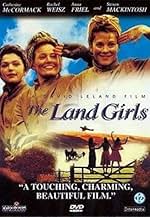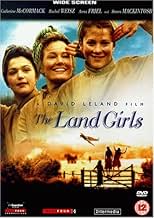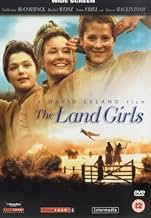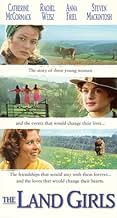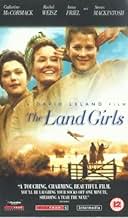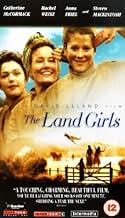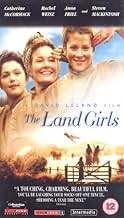ÉVALUATION IMDb
6,2/10
2,2 k
MA NOTE
Ajouter une intrigue dans votre langueThree young women from very different walks of life join the women's land army during World War II, and are sent to work together on a farm in Dorset, where the experience changes their live... Tout lireThree young women from very different walks of life join the women's land army during World War II, and are sent to work together on a farm in Dorset, where the experience changes their lives forever.Three young women from very different walks of life join the women's land army during World War II, and are sent to work together on a farm in Dorset, where the experience changes their lives forever.
Histoire
Le saviez-vous
- AnecdotesThe Reverend Alan Bennett, seen conducting the christening near the end of the film, is the actual Rector of the church where the scene was filmed.
- GaffesWhen Stella receives a phone call from her fiancé, she tells him that the "pips" are going and that he should insert more money to continue the call. The "pips" did not come in until 1959. Prior to that local calls were unlimited in duration and long distance calls were via the operator, who would announce when your time was up and you needed to insert further coins.
- Bandes originalesSpeed the Plough
Written by John Kirkpatrick, Michael Gregory (as Mike Gregory) and Howard Evans
Performed by The Albion Dance Band from Larkrise to Candleford
Published in the UK by Concorde International Management Consultants Ltd.
By permission of Leosong Copyright Service Ltd.
Commentaire en vedette
Stella (Catherine McCormack), Prue (Anna Friel) and Ag (Rachel Weisz) play three "land girls", volunteers to carry on the agricultural work of the men. On the farm they find love, conflict, friendship and cows. The film is more of a relationship drama of those left behind than an account of the second world war.
That said it is an interesting piece - not only is it different to have a WW2 film from a British point-of-view but also from a woman's point of view. It is interesting to see how those left behind acted with their lives and their war efforts - how close to the truth this account is, anyone's guess, it's a bit unrealistic because so many girl's experiences are crammed into the story of these three. The story is good regardless with the tangled relationships creating the glut of the plot, however the many tangled love stories do get a bit much at times but the themes of love, loss and British spirit during wartime tend to make up for it.
The performance from the lead trio are mixed, Weisz is a bit stereotyped as an upper-class woman ("rotter", "jolly good" etc) but gets better as her character develops. Friel is good as Prue who starts as the roughest of the group but is touched by the events in her life. McCormack (Stella) is meant to be the core of the story with her interactions with the farmers, especially the son Joe (Steven Mackintosh), but she plays it a little over earnest for my liking. Mackintosh has the most complex role and carries it off very well with the best performance in the film.
The film's conclusion is a mix of neat, tidy endings and some more emotional moments that more realistically depict the damage that the conflict caused on the people left behind.
Overall the film is not amazing but is an interesting account of WW2 from a different point of view, some of the events are a little stereotyped and lack a realistic feel but generally the film carries the emotions that many will have experienced at the time.
That said it is an interesting piece - not only is it different to have a WW2 film from a British point-of-view but also from a woman's point of view. It is interesting to see how those left behind acted with their lives and their war efforts - how close to the truth this account is, anyone's guess, it's a bit unrealistic because so many girl's experiences are crammed into the story of these three. The story is good regardless with the tangled relationships creating the glut of the plot, however the many tangled love stories do get a bit much at times but the themes of love, loss and British spirit during wartime tend to make up for it.
The performance from the lead trio are mixed, Weisz is a bit stereotyped as an upper-class woman ("rotter", "jolly good" etc) but gets better as her character develops. Friel is good as Prue who starts as the roughest of the group but is touched by the events in her life. McCormack (Stella) is meant to be the core of the story with her interactions with the farmers, especially the son Joe (Steven Mackintosh), but she plays it a little over earnest for my liking. Mackintosh has the most complex role and carries it off very well with the best performance in the film.
The film's conclusion is a mix of neat, tidy endings and some more emotional moments that more realistically depict the damage that the conflict caused on the people left behind.
Overall the film is not amazing but is an interesting account of WW2 from a different point of view, some of the events are a little stereotyped and lack a realistic feel but generally the film carries the emotions that many will have experienced at the time.
- bob the moo
- 23 oct. 2001
- Lien permanent
Meilleurs choix
Connectez-vous pour évaluer et surveiller les recommandations personnalisées
- How long is The Land Girls?Propulsé par Alexa
Détails
Box-office
- Brut – États-Unis et Canada
- 238 497 $ US
- Fin de semaine d'ouverture – États-Unis et Canada
- 20 921 $ US
- 14 juin 1998
- Brut – à l'échelle mondiale
- 238 497 $ US
- Durée1 heure 51 minutes
- Mixage
- Rapport de forme
- 2.35 : 1
Contribuer à cette page
Suggérer une modification ou ajouter du contenu manquant

Lacune principale
By what name was The Land Girls (1998) officially released in Canada in English?
Répondre


